ComfyUI Node: PixelTiledKSampleUpscalerProviderPipe
PixelTiledKSampleUpscalerProviderPipe
CategoryImpactPack/Upscale
Dr.Lt.Data (Account age: 747days) Extension
ComfyUI Impact Pack Latest Updated
2025-03-23 Github Stars
2.28K
How to Install ComfyUI Impact Pack
Install this extension via the ComfyUI Manager by searching for ComfyUI Impact Pack- 1. Click the Manager button in the main menu
- 2. Select Custom Nodes Manager button
- 3. Enter ComfyUI Impact Pack in the search bar
Visit ComfyUI Online for ready-to-use ComfyUI environment
- Free trial available
- 16GB VRAM to 80GB VRAM GPU machines
- 400+ preloaded models/nodes
- Freedom to upload custom models/nodes
- 200+ ready-to-run workflows
- 100% private workspace with up to 200GB storage
- Dedicated Support
PixelTiledKSampleUpscalerProviderPipe Description
Specialized node for upscaling images using tiled K-Sampler method, beneficial for AI artists seeking high-quality resolution enhancement.
PixelTiledKSampleUpscalerProviderPipe:
The PixelTiledKSampleUpscalerProviderPipe is a specialized node designed to upscale images using a tiled approach, leveraging the K-Sampler method. This node is particularly beneficial for AI artists looking to enhance the resolution of their images while maintaining high quality and detail. By dividing the image into smaller tiles, it ensures that the upscaling process is efficient and can handle larger images without running into memory issues. The primary goal of this node is to provide a seamless and effective way to upscale images, making it an essential tool for artists who need to work with high-resolution outputs.
PixelTiledKSampleUpscalerProviderPipe Input Parameters:
scale_method
This parameter determines the method used for scaling the image. It impacts the quality and style of the upscaled image. Different methods may produce varying results, so experimenting with this parameter can help achieve the desired effect.
seed
The seed value is used to initialize the random number generator, ensuring reproducibility of the upscaling process. By setting a specific seed, you can achieve consistent results across different runs. The default value is typically set to a random number.
steps
This parameter defines the number of steps the upscaling process will take. More steps generally result in higher quality but will take longer to process. The minimum value is 1, and there is no strict maximum, but higher values will increase processing time.
cfg
The cfg parameter, or configuration, controls the strength of the guidance during the upscaling process. Higher values will make the upscaler adhere more strictly to the input image, while lower values allow for more creative freedom. The default value is usually set to a balanced level.
sampler_name
This parameter specifies the name of the sampler to be used in the upscaling process. Different samplers can produce different styles and qualities of upscaled images. The available options depend on the installed samplers in your environment.
scheduler
The scheduler parameter determines the scheduling strategy for the upscaling steps. It affects how the steps are distributed over the upscaling process, which can influence the final image quality.
denoise
This parameter controls the amount of denoising applied during the upscaling process. Higher values will result in smoother images, while lower values retain more texture and detail. The default value is typically set to a moderate level.
tile_width
The width of each tile used in the upscaling process. Smaller tiles can handle more detailed upscaling but may increase processing time. The minimum value is usually set to a small number, and the maximum value depends on the image size and available memory.
tile_height
The height of each tile used in the upscaling process. Similar to tile_width, smaller tiles can handle more detailed upscaling but may increase processing time. The minimum value is usually set to a small number, and the maximum value depends on the image size and available memory.
tiling_strategy
This parameter defines the strategy used for tiling the image. Different strategies can affect the efficiency and quality of the upscaling process. Experimenting with this parameter can help optimize the results for specific images.
basic_pipe
The basic_pipe parameter is a tuple containing the model, VAE, positive, and negative prompts used in the upscaling process. It provides the necessary components for the upscaler to function correctly.
upscale_model_opt (optional)
This optional parameter allows you to specify a custom upscaling model. If not provided, the default model will be used.
pk_hook_opt (optional)
This optional parameter allows you to specify custom hooks for the PixelKSample upscaler. These hooks can modify the behavior of the upscaler to achieve different effects.
tile_cnet_opt (optional)
This optional parameter allows you to specify custom options for the tile control network. It can be used to fine-tune the tiling process for better results.
PixelTiledKSampleUpscalerProviderPipe Output Parameters:
upscaler
The upscaler output is an instance of the PixelTiledKSampleUpscaler class. It represents the upscaled image and contains all the necessary information and methods to further process or save the image. This output is crucial for obtaining the final high-resolution image after the upscaling process.
PixelTiledKSampleUpscalerProviderPipe Usage Tips:
- Experiment with different
scale_methodvalues to find the best upscaling technique for your specific image. - Use a consistent
seedvalue to ensure reproducibility of your results, especially when working on a series of images. - Adjust the
stepsparameter to balance between processing time and image quality. More steps generally yield better results but take longer. - Fine-tune the
cfgparameter to control the adherence to the input image. Higher values produce more accurate upscales, while lower values allow for more artistic freedom. - Choose the appropriate
tile_widthandtile_heightbased on your system's memory capacity to avoid running into memory issues.
PixelTiledKSampleUpscalerProviderPipe Common Errors and Solutions:
[ERROR] PixelTiledKSampleUpscalerProviderPipe: ComfyUI_TiledKSampler custom node isn't installed. You must install BlenderNeko/ComfyUI_TiledKSampler extension to use this node.
- Explanation: This error occurs when the required
ComfyUI_TiledKSamplercustom node is not installed in your environment. - Solution: Install the
BlenderNeko/ComfyUI_TiledKSamplerextension to ensure thePixelTiledKSampleUpscalerProviderPipenode functions correctly. Follow the installation instructions provided by the extension's documentation.
PixelTiledKSampleUpscalerProviderPipe Related Nodes
- Description
- PixelTiledKSampleUpscalerProviderPipe:
- PixelTiledKSampleUpscalerProviderPipe Input Parameters:
- PixelTiledKSampleUpscalerProviderPipe Output Parameters:
- PixelTiledKSampleUpscalerProviderPipe Usage Tips:
- PixelTiledKSampleUpscalerProviderPipe Common Errors and Solutions:
- Related Nodes
RunComfy is the premier ComfyUI platform, offering ComfyUI online environment and services, along with ComfyUI workflows featuring stunning visuals. RunComfy also provides AI Playground, enabling artists to harness the latest AI tools to create incredible art.




